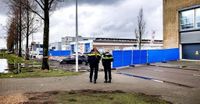In a significant ruling, 21-year-old Shairone S. has been sentenced to 14 years in prison for the fatal shooting of Danzel Silos, a 26-year-old rap musician known as Bigidagoe. The verdict was delivered on April 11, 2025, by a court in Amsterdam, which noted the Public Prosecution Service's recommendation of 16 years but ultimately decided on a slightly lesser sentence.
The tragic incident occurred on February 25, 2024, following a party at a venue on the Rhoneweg near Amsterdam Sloterdijk. The court heard that Shairone S. had gotten into an argument with a group of men, which he later described as making him feel “belittled.” This confrontation escalated into violence, with S. reportedly being slapped and pushed to the ground before he retaliated by firing four shots at the group, all of which struck Bigidagoe.
"The ease with which the man grabbed a firearm and took another person’s life is shocking," the court stated, emphasizing the reckless nature of the act, especially given that it took place in a public area where many people were present. Fortunately, no additional victims were reported, which the court acknowledged as a silver lining in an otherwise tragic scenario.
During the trial, it was revealed that the dispute may have stemmed from a conflict over a chain. Initially, Shairone S. denied any involvement in the shooting but later confessed, claiming that he did not intend to kill Bigidagoe. Instead, he stated that he was aiming at someone else in the group. The court found this claim unconvincing, given the circumstances surrounding the shooting.
The shooting left Bigidagoe with fatal injuries, penetrating his heart, liver, and kidney. Despite the swift arrival of emergency services, resuscitation efforts were unsuccessful, and he succumbed to his injuries shortly thereafter. The aftermath of the shooting sent shockwaves through the Amsterdam community, leading to unrest, including explosions and graffiti indicating a “war” in the days following the incident.
Shairone S. was apprehended in Paris while attempting to flee to French Guiana. Video evidence presented in court depicted him arguing with several men before he obtained a firearm from a friend and discharged it at the group. This footage, coupled with wiretapped conversations, suggested that Bigidagoe was not the intended target of the gunfire, further complicating the narrative around the shooting.
The court's decision to impose a 14-year sentence reflects both the severity of the crime and the young age of the defendant. The court acknowledged S.'s eventual acceptance of responsibility, but it also highlighted the disturbing trend of firearm possession and use among young individuals in similar situations. "He has ended a young life and caused irreparable harm to the relatives," the judge remarked, emphasizing the broader implications of such violence.
Bigidagoe was not just a rapper; he was a member of Zone6, a notorious rap group from Amsterdam-Zuidoost, which has been frequently associated with serious criminal activities, including violence and drug trafficking. His music often reflected the harsh realities of street life, and he had garnered millions of views on platforms like YouTube. His death has left a significant void in the local music scene.
In the wake of Bigidagoe's death, there have been calls from various community leaders and activists for stronger measures to combat gun violence and to address the underlying issues that lead to such tragic events. The Public Prosecution Service described the shooting as "tragic" and "extremely reckless," noting the public safety concerns raised by the incident.
As the legal proceedings concluded, Shairone S. was also ordered to pay over 82,000 euros in damages to Bigidagoe's family, a financial burden that underscores the profound impact of his actions. The court's ruling serves as a reminder of the consequences of gun violence and the need for continued dialogue and action to prevent such tragedies in the future.
While the sentence may provide a sense of justice for Bigidagoe's family and fans, it also raises questions about the societal factors that contribute to youth violence and the normalization of firearms in everyday life. The community continues to grapple with the aftermath of this senseless act, hoping for healing and a path forward that prioritizes safety and peace.








